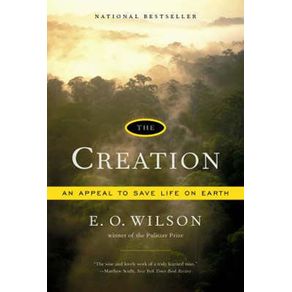The book that launched a movement: Wilson speaks with a humane eloquence which calls to us all (Oliver Sacks), proposing a historic partnership between scientists and religious leaders to preserve Earth's rapidly vanishing biodiversity. The Creationis E. O. Wilson's most important work since the publications of Sociobiology and Biophilia, Like Rachel Carson's Silent Spring, it is a book about the fate of the earth and the survival of our planet. Yet while Carson was specifically concerned withinsecticides and the ecological destruction of our natural resources, Wilson, the two-time Pulitzer Prize-winner, attempts his new social revolution by bridging the seemingly irreconcilable worlds of fundamentalism and science. Like Carson, Wilson passionately concerned about the state of the world, draws on his own personal experiences and expertise as an entomologist, and prophesies that half the species of plants and animals on Earth could either have gone or at least are fated for early extinction by the end of our present century. Astonishingly, The Creation is not a bitter, predictable rant against fundamentalist Christians or deniers of Darwin. Rather, Wilson, a leading secular humanist, draws upon his own rich background as a boy in Alabama who took the waters, and seeks not to condemn this new generations of Christians but to address them on their own terms. Conceiving the book as an extended letter to a southern Baptist minister, Wilson, in stirring language that can evoke Martin Luther King's Letter from Birmingham Jail, tells this everyman minister how, in fact, the world really came to be.



